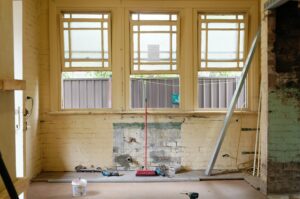Are you considering buying a fixer-upper? This comprehensive guide outlines the pros and cons of purchasing a property in need of renovation, helping you make an informed decision. Explore the challenges and benefits of investing in a fixer-upper to determine if it’s the right choice for you.
Embracing the Possibilities of a Fixer-Upper
Have you ever walked into a house that needs a little TLC and felt a surge of excitement? The prospect of turning a neglected property into your dream home can be incredibly alluring. Buying a fixer-upper can offer a unique opportunity to create a living space that truly reflects your vision, style, and personality. However, this adventure is not without its challenges.
In this comprehensive guide, we will delve into the pros and cons of buying a fixer-upper. From uncovering hidden potentials to navigating potential pitfalls, we will equip you with valuable insights to help you make a well-informed decision. Let’s explore the exciting world of fixer-uppers and see if this endeavor is worth the investment.
1. The Pros of Buying a Fixer-Upper
1.1. Cost Savings and Investment Potential
Purchasing a fixer-upper is often more affordable than buying a turnkey property. Since these homes require renovation or repairs, they tend to have a lower upfront cost, providing an opportunity to save money on the purchase. Additionally, as you transform the property through renovations, you have the potential to increase its value, yielding a significant return on investment.
1.2. Customization and Personalization
One of the most significant advantages of buying a fixer-upper is the ability to customize and personalize the property according to your preferences. From the layout and design to the choice of materials, you have the freedom to create a space that aligns perfectly with your lifestyle and taste.
1.3. Creative Fulfillment and Sense of Accomplishment
Taking a fixer-upper and turning it into a beautiful and functional home can be an immensely satisfying experience. The process of transforming a neglected property into a comfortable living space can ignite your creativity and provide a profound sense of accomplishment.
1.4. Potential for Discovering Hidden Gems
Fixer-uppers are often overlooked gems with hidden potential. With a discerning eye and a skilled inspector, you can unveil features and aspects of the property that others may have missed. Uncovering these hidden gems can add character and uniqueness to your future home.
1.5. Less Competition in the Market
Due to the challenges involved in renovating a property, fixer-uppers tend to have less competition in the real estate market. This reduced demand can give you an advantage as a buyer, providing the opportunity to negotiate a better deal.
2. The Cons of Buying a Fixer-Upper
2.1. Renovation Costs and Time Investment
While the idea of creating your dream home is appealing, the reality of renovation costs and time commitment can be daunting. Renovations can quickly add up, and unexpected issues may arise during the process, leading to delays and additional expenses.
2.2. Stress and Uncertainty
The renovation journey can be stressful, especially if you encounter unexpected challenges or delays. Managing contractors, overseeing the renovation, and dealing with setbacks can take a toll on your emotional well-being.
2.3. Financial Risks
Investing in a fixer-upper comes with inherent financial risks. If the renovations exceed your budget or the housing market declines, you may not recoup your investment when selling the property.
2.4. Potential for Unforeseen Issues
Older properties, especially those requiring extensive renovations, may have hidden structural or safety issues. Unforeseen problems can escalate costs and disrupt your renovation timeline.
2.5. Limited Financing Options
Securing financing for a fixer-upper can be more challenging than obtaining a mortgage for a move-in-ready home. Some lenders may be hesitant to finance a property that needs significant repairs.
3. Is a Fixer-Upper Right for You?
Before embarking on a fixer-upper journey, it’s essential to evaluate whether this investment aligns with your goals, budget, and temperament. Ask yourself the following questions to determine if a fixer-upper is the right choice for you:
- Do you have the time and energy to devote to a renovation project?
- Are you comfortable managing contractors and overseeing the renovation process?
- Do you have a realistic budget that accounts for potential unforeseen costs?
- Are you willing to embrace the uncertainty and potential setbacks that come with renovations?
- Are you prepared to live in a construction zone while the property is being renovated?
- Do you have access to financing options that suit the needs of a fixer-upper purchase?
By honestly answering these questions, you can gain clarity about whether buying a fixer-upper is the right decision for you.
FAQs
Q: How much money can I save by buying a fixer-upper?
A: The amount you can save on a fixer-upper varies depending on factors like the property’s location, condition, and market trends. On average, you may save anywhere from 15% to 40% compared to the cost of a move-in-ready home.
Q: Can I do the renovations myself to save money?
A: While DIY renovations can save money, they are best suited for individuals with adequate skills and experience. For complex tasks or projects requiring permits, it’s advisable to hire professional contractors.
Q: What if I discover major issues during the renovation?
A: Uncovering major issues during renovations is not uncommon. It’s essential to have a contingency fund in your budget to address unexpected problems and ensure your project stays on track.
Q: How long does a typical fixer-upper renovation take?
A: The duration of a fixer-upper renovation varies depending on the scope of work. Minor renovations may take a few months, while extensive overhauls could last a year or longer.
Q: Are there any tax benefits to buying a fixer-upper?
A: Depending on your country and local laws, there might be tax incentives for renovating older properties, such as historic tax credits. Consult with a tax professional to explore potential benefits.
Q: Should I get a home inspection before purchasing a fixer-upper?
A: Absolutely! A thorough home inspection is crucial before buying a fixer-upper. A professional inspector can identify potential issues, helping you make an informed decision and negotiate the purchase price.
Conclusion: Weighing the Pros and Cons
Buying a fixer-upper is an exciting adventure that offers the potential for cost savings, customization, and creative fulfillment. However, it’s essential to approach this endeavor with eyes wide open, as it comes with its share of challenges and risks.
Consider your budget, time, and comfort level with renovations before committing to a fixer-upper purchase. If you have the passion, patience, and resources, the rewards of turning a neglected property into a beautiful home can be immeasurable.
Ultimately, whether a fixer-upper is worth the investment depends on your unique circumstances and vision for your dream home. With careful planning, a reliable team of professionals, and a touch of optimism, you can transform a fixer-upper into a space that truly feels like home.


